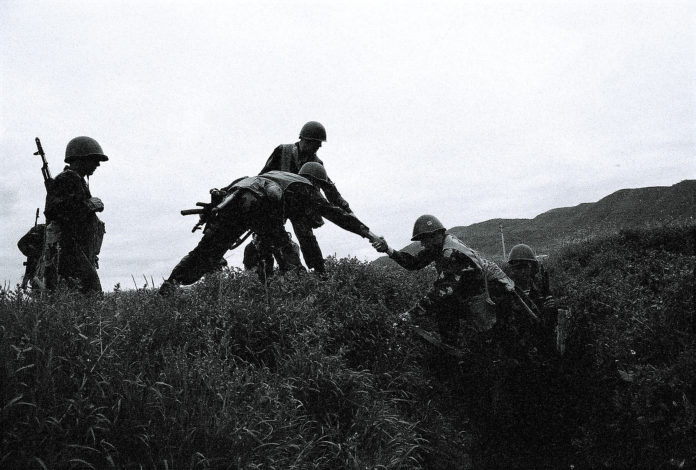Edward Colmenares
News Editor
In response to the devastating crisis progressing in the Nagorno-Karabakh region of Azerbaijan, The Bottom Line sat down with UC Santa Barbara (UCSB) Armenian students, Stepanian and Assadourian, to discuss the emotional turmoil Armenians everywhere are experiencing as their country delves further into instability.
As a historical preface, Nagorno-Karabakh’s population and culture are mainly Armenian, but the region was officially allocated to Azerbaijan by the Soviet Union. With the gradual fall of communism, however, both Armenia and Azerbaijan claimed sovereignty from Russia, and thus began territorial disputes leading to the 1988 Nagorno-Karabakh War where thousands died and hundreds of thousands were displaced on both sides.
As Armenian forces gained control of the Nagorno-Karabakh region, a shaky ceasefire was signed in 1994, ending immediate fighting but not solving the larger territorial issue. Conflicts between the two states have risen since but not particularly to a severe degree.
Now functioning as a mostly separatist state, Nagorno-Karabakh is politically controlled by Armenian figures supported by the Armenian government to Azerbaijan’s dismay.
Political tensions between the two countries boiled over on Sept. 27 when Armenia accused Azerbaijan military forces of bombing Nagorno-Karabakh towns and cities without any reasonable provocation. Azerbaijan responded with accusations stating that Armenia had shot down Azerbaijan military aircraft and was to be met with severe retaliation.
Since then, Azerbaijan has hastily approved a controversial offensive, marked by excessive use of artillery shellings on civilian populations. As of Sept. 27, the Nagorno-Karabakh region has witnessed 31 civilian deaths, 532 military deaths, and hundreds of hospitalized civilians.
To make matters worse, Turkey has allegedly sent weapons and Syrian mercenaries to support Azerbaijan against Armenia.
Fourth-year UCSB student Assadourian, majoring in psychology and brain sciences with a minor in sociolinguistics, finds herself in a constant state of worry as news about the Armenian crisis gradually becomes more critical.
“I see my mental health going on a decline. I see myself … neglecting my classes because this is all I can think about. Because my people’s existence is under threat,” said Assadourian. “How can you expect somebody to just go on about their day without thinking about what’s going on … when my country, my people, are currently being killed and our existence is under threat.”
“How can you expect somebody to just go on about their day without thinking about what’s going on… When my country, my people, are currently being killed and our existence is under threat.”
Working as the publicist for the Armenian Student Association at UCSB, Assadourian runs the official club Instagram where she posts routinely in efforts to raise awareness and funds for the crisis. She is also heavily involved in club activities where she has noticed general despair among the Armenian students here.
“Everyone feels the same way. All of us can’t focus on our lessons. All of us can’t focus on our everyday lives. This is something that’s weighing down on us constantly, every minute of every day,” Assadourian elaborated.
“You’ll be cooking your food and in the back of your mind, you’re thinking ‘There are soldiers on the front line who don’t have food right now. People are in bomb shelters right now, scrambling for food.’ It’s not an easy thing to deal with.”
Assadourian also fears for her family and friends currently living in Armenia, stating, “It’s really scary thinking about these people that I know, that I love, and I care about … To think that their lives are being threatened every day, every moment is just super scary.”
During her last quarter at UCSB, Stepanian, a philosophy major with a minor in applied psychology, finds herself and her Armenian peers in a perpetual cycle of anxiety brought on by the Azerbaijan offensive.
“We’re just online 24/7, update: Google to Instagram, Instagram to Facebook, Facebook to Twitter … all in the same circular pattern. We’re not getting any sleep. None of us have slept in like two weeks. We’re just going in the circle trying to see what’s going on next,” stated Stepanian. Such a stressful routine has interfered with her studies.
“I want to do good in school, but I also want to be able to point at a map and show people where I’m from one day,” Stepanian explained.
Adding to her distress, Stepanian feels hurt “that people want to remain neutral or unbiased and not educate themselves on the actual history affecting what’s happening.”
The crisis in Nagorno-Karabakh is drastically becoming worse as a ceasefire, announced last Saturday, has been broken by supposedly both parties.
The Bottom Line will continue following the crisis, and will soon release an update regarding the response of UCSB and what students here are doing to support Armenia.











